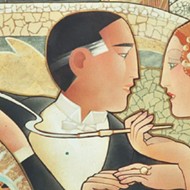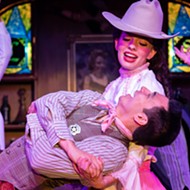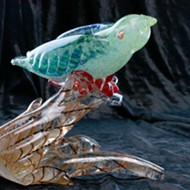[
{
"name": "Promo Temp Targeted",
"id": "PromoTempTargeted",
"class": "inlineCenter",
"insertPoint": "4",
"component": "15511697",
"requiredCountToDisplay": "0"
},
{
"name": "Ad - Medium Rectangle CC01 - 300x250 - Inline Content",
"class": "inlineCenter",
"insertPoint": "8",
"component": "15582119",
"requiredCountToDisplay": "12"
},{
"name": "Ad - Medium Rectangle LC01 - 300x250 - Inline Content",
"class": "inlineCenter",
"insertPoint": "18",
"component": "15582122",
"requiredCountToDisplay": "22"
},{
"name": "Ad - Medium Rectangle 9 - 300x250 - Inline Content",
"class": "inlineCenter",
"insertPoint": "28",
"component": "15582121",
"requiredCountToDisplay": "32"
}]
Honest criticism can be a treacherous road when it comes to community theater.
Of course, if the play is good, you traverse it unscathed. The director of the performance loves you, thanks you personally for your support, reminds you how much he or she adores your publication, and mentions to your editor what a promising young writer you are. Keep up the good work, they all say—“good work” meaning, naturally, unwavering public praise of their productions. But writing nice things is easy.
(Well, it still takes work in the way that all creative, thoughtful things do. It doesn’t require nerves of steel is what I’m driving at.)
If the play is awful, well, there’s a dilemma for you. Either suck it up and try to find something nice to say about the production—lie, basically—or suck it up and say the truth. Neither choice is very pleasant, but for different reasons. The former brings about an internal unpleasantness: You feel disappointed in yourself. You wallow in the brine of your own cowardice. The latter is more external: You invite upon yourself the scorn of every individual in the production, many of whom are friends of friends, and most of whom are unpaid volunteers. Amazingly, nobody thanks you or compliments your insightful prose.
“Do I want to be microwaved or burned alive?” That’s what you, the critic, must ask yourself.
Most local papers choose the former, their reviews flatly stating, “This is a play about this. This happened, followed by this. It’s a good play. It’s directed by this director. Everyone did a good job. Good job, everyone. The end.”
Summary dominates, making room toward the middle for a few safe, objective facts and a cautious, even sprinkling of praise, often ending crudely on some irrelevant, technical note. Analysis is rare in these parts, opinion a dance with the devil.
It’s been hard for me, too, to express a critical view. Not that I ever looked entirely the other way. But I have squinted a lot in my time, coming up with soft, polite little blows. Hardly noticeable. When once describing an actress as “sometimes guilty of overacting,” I quickly buried it with “but when called for, her performance is extremely moving, her emotional reach impressive.”
In another, otherwise positive review, I once worked up the courage to say, “There’s a lot of campy, satirical fun to be had with this show, something I wished I could have seen a little bit more of.”
At this point I applied a soothing balm: “Don’t get me wrong; this is a great show ... ” before gathering the courage to say, “But sometimes, dialogue that could have been comedic gold was encumbered by too-conservative acting and timing that felt somehow unnatural. It was a slow start.”
I proceeded to try to reconcile myself with several simpering, don’t-hurt-me paragraphs. Why on Earth am I so afraid of theater people?
New Times once had a theater critic by the name of Bill Beeson. This man, may he rest in peace, was by many accounts the last bastion of real criticism on the Central Coast. As I leafed backward through the archives, the first trace I found of his existence was an angry Letter to the Editor from one Stewart Moss, beginning thus: “I directed ‘Funny Girl’ at the SLO Little Theatre that your critic Bill Beeson trashed. I was appalled by the vitriolic tone of Mr. Beeson’s comments. It is obvious he came in not liking the play or the score.”
Trashed!? Vitriolic? This I had to see. Breathless, I searched for Beeson’s review of Funny Girl. What I turned up, though, wasn’t the belligerent tirade I’d expected, but a thoughtful, well-supported critique. It seemed to me that he honestly wanted the show to succeed.
“For one shining moment … I kept saying to myself: ‘It’s happening! The show’s gonna soar now!,’ desperately wanting it to happen. But it never did,”
he wrote.
It seemed to me Beeson respected the production enough to give it the same treatment as any in Los Angeles or his hometown of New York, inspecting each angle of the show and delivering his findings in an intelligent, engaging style. In the end, though, because his verdict was largely unfavorable, it was Beeson, not Funny Girl, who got trashed in vitriolic tones.
I heard he was banned from the Little Theatre at one point. Whether or not that’s true, I haven’t the faintest. I do believe his honesty improved the quality of local theater. And I know for a fact that that statue on the Little Theatre’s front lawn is a memorial to him.
That’s when I realized our reviews needed to be rawer, to shed a layer of politeness. Problem is, I’m the only one who writes them, and I’m too scared. So I’ve created an alternate personality to write some of my theater reviews. Her name is Eva Schwarzweiss. She is an aging, opinionated dame with a Teutonic brusqueness and a swooning love of good theater. Where Anna’s writing is floppy, flowery, and docile, Eva’s will be sharp and succinct and true. Not that I created her to be mean-spirited—never! It’s just that our theater community is so little, and I know a lot of the people in it, and my problems writing analytically often arise from feeling too close to the subject. Eva is a way to create distance, to be honest, to start afresh.
A viable critique of critics says they cannot act worth anything and thus resort to bitterly picking apart those who can. Maybe so, but at least I, too, can find truth in a role.
Arts Editor Anna Weltner can be reached at aweltner@newtimesslo. Try Eva at the same address.










